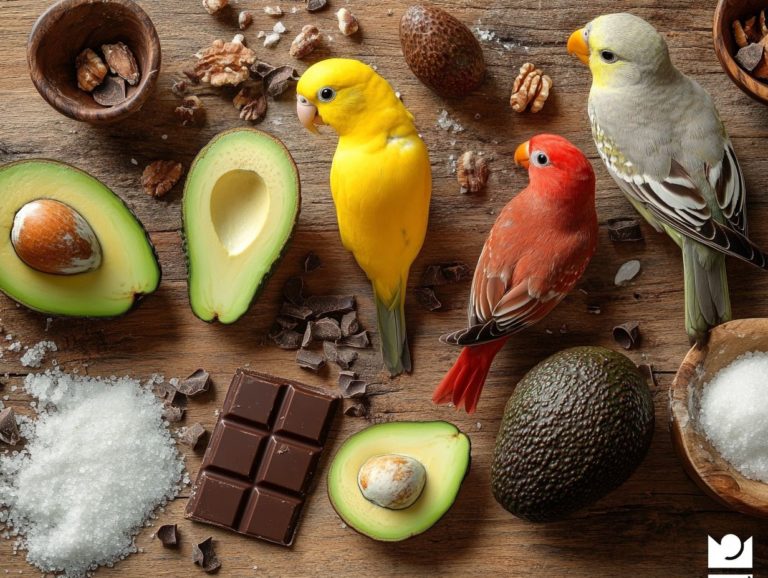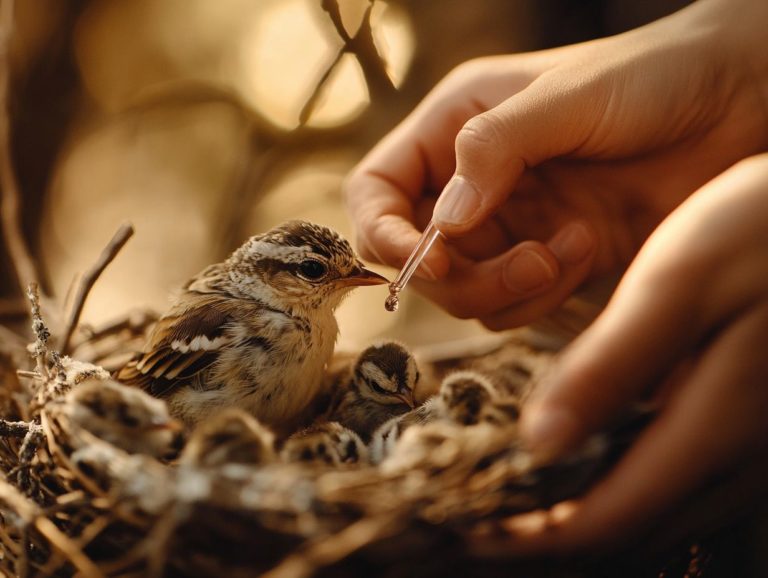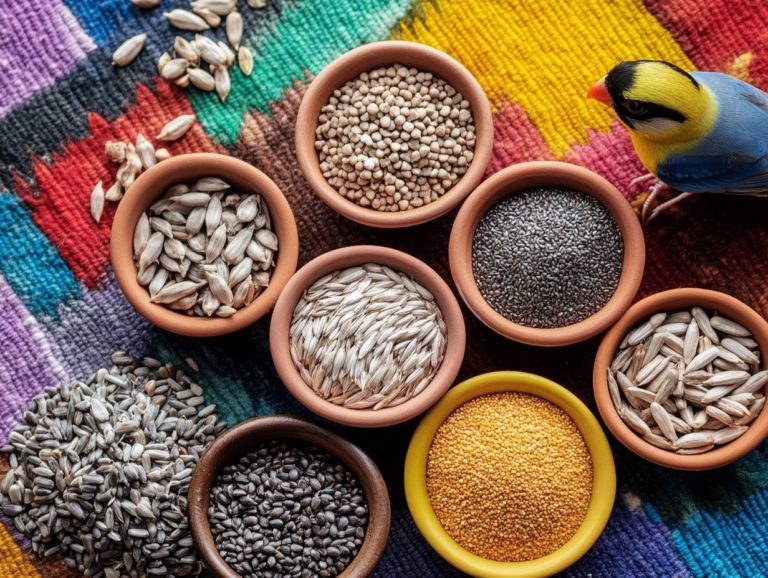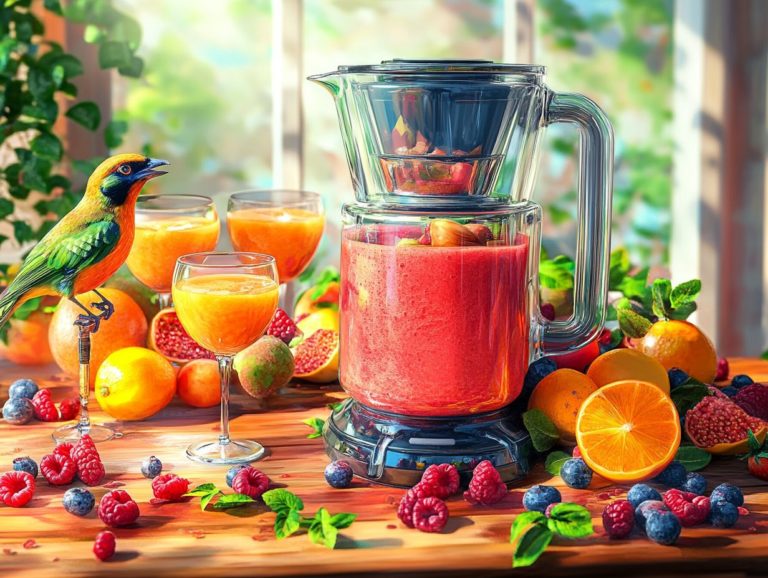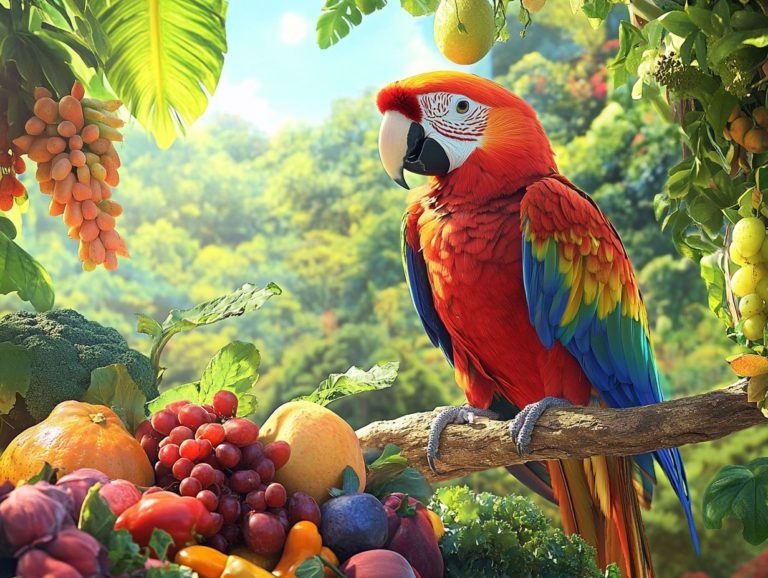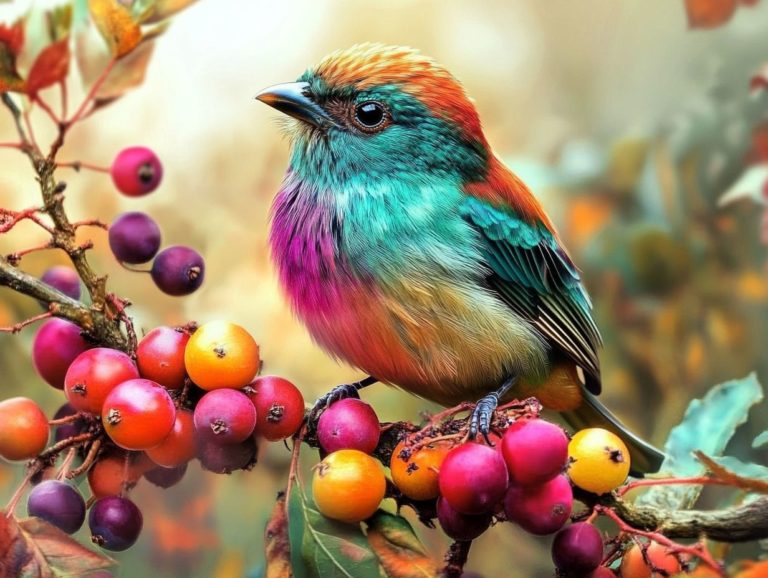5 Key Factors for Choosing Bird Food
Choosing the right bird food can feel overwhelming. Many options are available, and knowing your bird’s needs is crucial for their health and happiness.
This guide will explore five key factors to help you select the best food for your feathered companion. From the type of bird you own to their nutritional requirements and individual preferences, this information will empower you to make informed choices.
Discover the essentials for keeping your bird well-fed and thriving!
Contents
- Key Takeaways:
- 1. Type of Bird
- 2. Nutritional Requirements
- 3. Food Quality and Freshness
- 4. Cost and Budget
- 5. Personal Preferences and Availability
- What Are the Different Types of Bird Food?
- Frequently Asked Questions
- What are the 5 key factors to consider when choosing bird food?
- How do I determine the nutritional value of bird food?
- Is it important to consider the type of bird when choosing food?
- What should I look for in a seed mix for birds?
- Why is freshness important in bird food?
- Does the brand of bird food matter?
Key Takeaways:
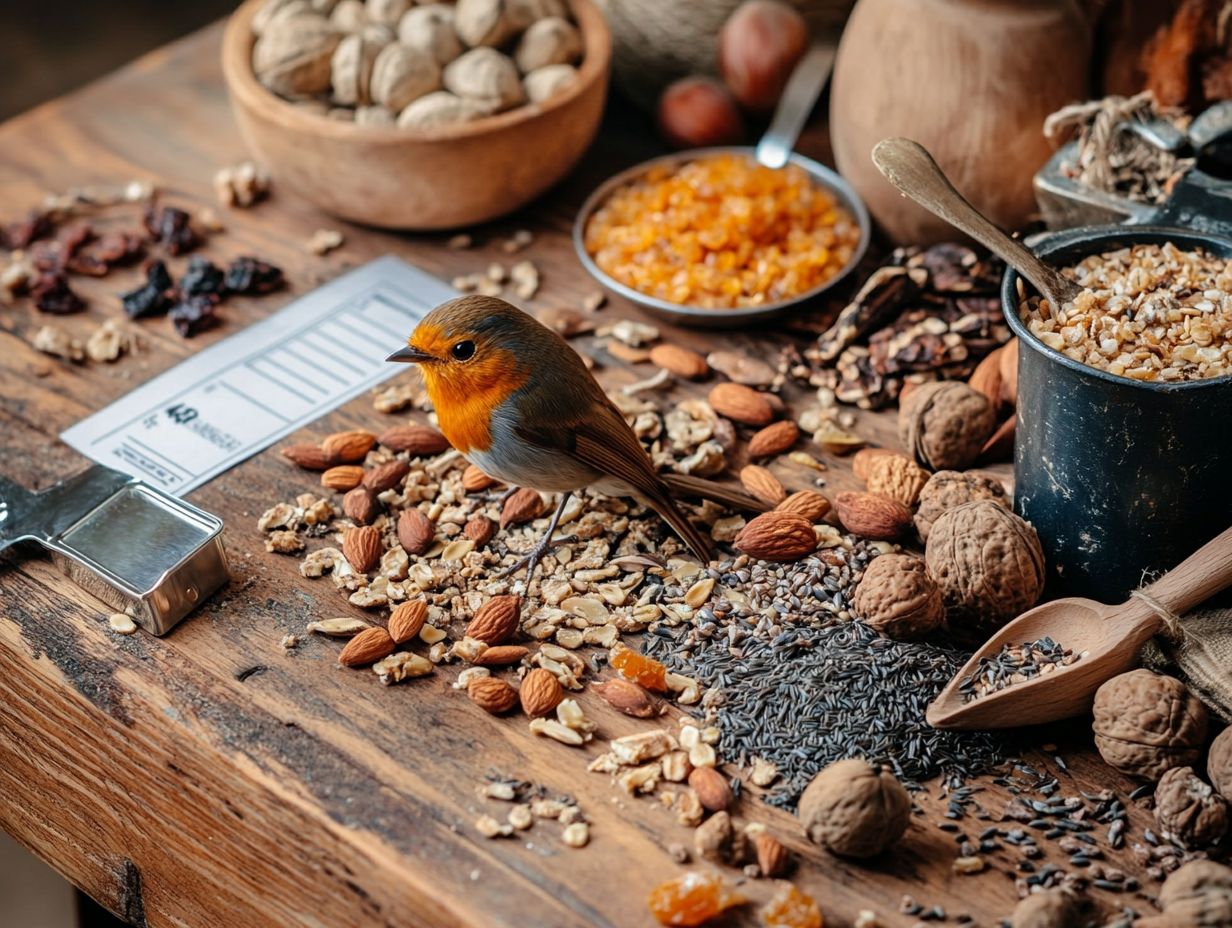
- Consider your bird’s specific type when choosing food to meet their unique dietary needs.
- Evaluate the nutritional requirements of your bird and choose a food that provides a balanced diet.
- Choose high-quality and fresh bird food to ensure your bird receives the necessary nutrients and avoids potential health issues.
1. Type of Bird
Understanding the diverse types of birds in your outdoor space is crucial for you as a birdwatcher or enthusiast. It allows you to select the right bird feeders and food options, attracting a delightful variety of species like woodpeckers, chickadees, and hummingbirds.
Each bird species comes with its own unique feeding preferences, guiding you on the type of bird food to provide. Whether it s sunflower seeds for ground-feeding birds or nectar for hummingbirds, you re setting the stage for an enjoyable experience.
For example, woodpeckers can t resist suet feeders filled with high-fat suet cakes, especially during chilly months when natural food sources become scarce. Chickadees, in contrast, prefer tube feeders packed with mixed seeds, allowing them to cling effortlessly while feasting.
As for vibrant hummingbirds, a nectar feeder filled with a sugar-water mixture is essential to attract these agile fliers. To enhance your birdwatching experience, consider adding a bird guidebook to your setup. This will help you identify species by their shape, color, and feeding behaviors.
Transform your backyard into a lively bird-friendly space that you can enjoy and cherish.
2. Nutritional Requirements
Bird nutrition plays a pivotal role in maintaining vibrant bird populations. Different bird species have distinct dietary needs, requiring a well-balanced approach that includes seed mixtures, sunflower seeds, dried fruit, and specialized options like suet formulations and hummingbird food.
Each type of bird food fulfills a unique purpose, delivering essential nutrients that attract specific species and support their health throughout the seasons. For instance, woodpeckers thrive on protein-rich suet, offering necessary fats and energy, especially during colder months when insects are hard to find.
On the other hand, chickadees have a penchant for high-fat seeds, important during spring and fall when they need extra calories for migration and breeding activities. Make sure to adjust these offerings with the seasons.
In winter, a mix of energy-dense foods is essential, while in spring, focusing on insects and fresh seeds aligns more closely with their natural dietary preferences. By providing a varied selection, you support the health of these feathered friends and foster a diverse community right in your backyard.
3. Food Quality and Freshness
The quality and freshness of bird food are vital for attracting birds and ensuring their health. Make it a habit to check your feeders regularly and replenish them with fresh seeds and quality bird food.
Focus on proper seed storage and feeder maintenance to create an inviting environment that encourages your feathered friends to visit often. Consider purchasing bird food in smaller quantities to keep it fresh and free from harmful contaminants.
It’s crucial to inspect the food frequently for any signs of mold or an off smell, as stale seeds can deter birds and compromise their health. For optimal storage, keep your bird food in a cool, dry place, using airtight containers to minimize moisture and pests.
Regularly washing your feeders helps maintain cleanliness, preventing the buildup of mold or bacteria. This ensures that the food remains safe and appealing for the birds you wish to attract.
Start your bird feeding journey today and watch your backyard come to life!
4. Cost and Budget
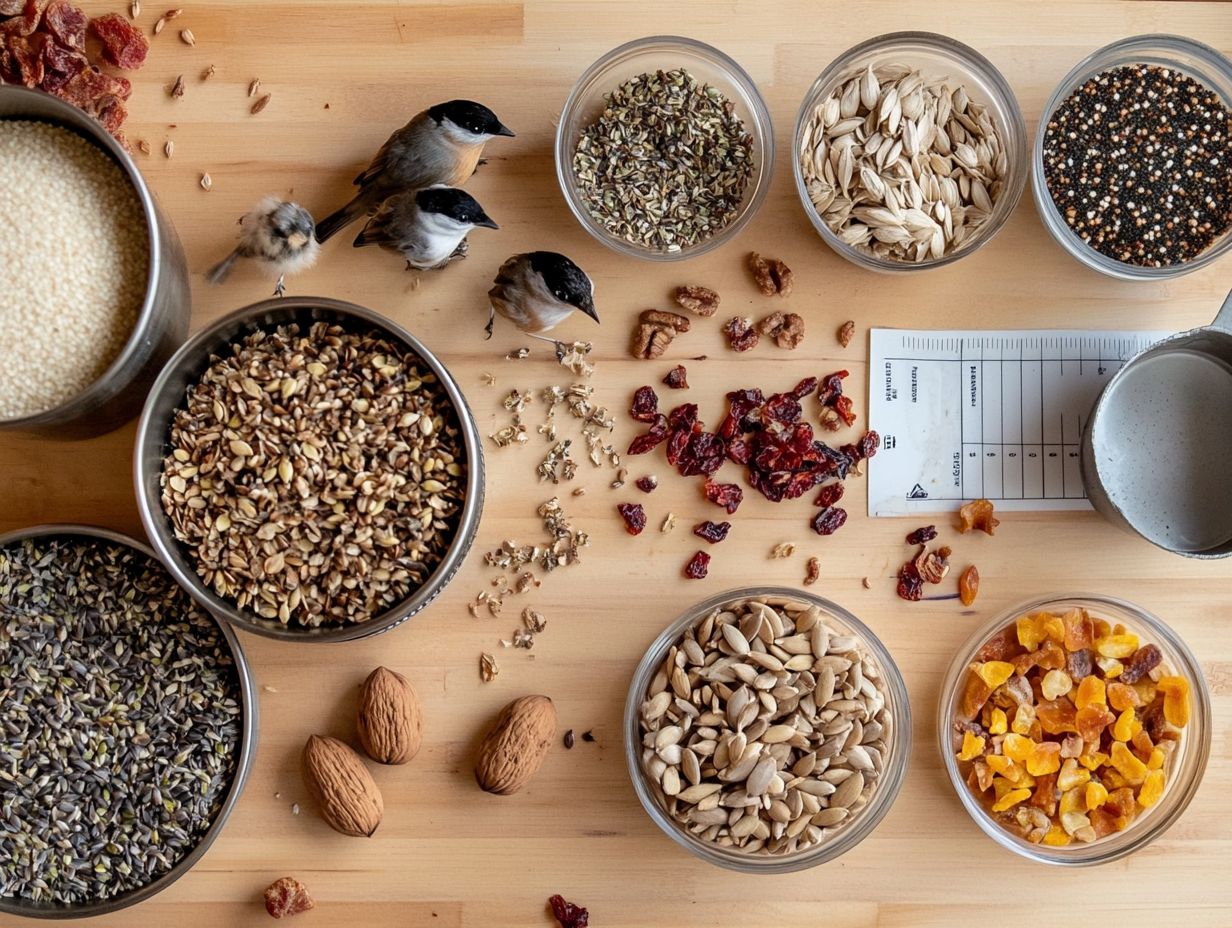
Feeding birds can be a delightful experience. Let’s explore how to do it wisely! Managing costs while providing high-quality bird food is a common concern among bird enthusiasts. Effective budgeting allows you to include a variety of seeds that cater to different bird species without straining your finances. By exploring affordable bird food options and utilizing secure containers for storage, you can easily keep your birds happily fed.
One effective strategy for reducing expenses is buying in bulk. This often leads to significant savings. Opting for local or store brands can help maintain quality while keeping prices pleasantly low.
Incorporating kitchen scraps, such as unsalted peanuts and dried fruits, adds nutritional variety and keeps costs manageable. Watch for seasonal sales and connect with a birding community for valuable insights on cost-effective food sources.
By implementing these strategies, you can maintain a diverse diet for your feathered friends without compromising on essential nutrients.
5. Personal Preferences and Availability
Understanding your personal preferences and the availability of food choices is essential for successfully feeding birds. Different bird species often favor specific seed mixes, berries, or even unique offerings like peanut butter and cornmeal. For optimal results, consider choosing the right food storage for birds to align your food choices with the preferences of local bird species, creating an enticing feeding environment that attracts a diverse array of feathered friends throughout the year.
For example, berry-eating birds are particularly drawn to wild berries. This can inform your selection of dried fruits as a convenient substitute during the off-seasons. Observing local patterns such as which birds frequent your area most often provides valuable insights for tailoring your offerings. Gaining an understanding of the local flora and fauna will help you identify common species, allowing you to adapt your choices to what is naturally available in your surroundings.
By creating a diverse array of foods, you can foster a welcoming atmosphere, transforming your backyard into a vibrant haven for various birds. This not only enhances their diet but also enriches your experience as you enjoy their presence.
What Are the Different Types of Bird Food?
The variety of bird food available on the market is truly impressive, featuring options like sunflower seeds, nyjer seeds, suet, peanuts, and dried fruit each tailored to meet the distinct dietary needs of various bird species. By selecting the right types of bird food, you draw a delightful array of birds to your backyard while supporting their nutritional needs throughout the seasons.
Take sunflower seeds, for instance; they re a beloved choice among many songbirds, packed with healthy fats. Nyjer seeds, on the other hand, are particularly enticing to finches, providing those essential oils they crave. Suet, a type of bird food made from animal fat, serves as an excellent energy source for woodpeckers and other insect-eating birds, especially during the colder months. Peanuts can lure in jays and titmice, delivering a hearty dose of protein and fat, while dried fruits offer a sweet, vitamin-rich nibble for various species.
If you re looking to add a personal touch, experimenting with DIY bird food recipes can be a rewarding endeavor. By mixing ingredients like oats, seeds, and fruits, you can create a balanced diet that caters to the local avian community, ensuring they receive both enjoyment and nourishment.
How Can One Determine the Nutritional Requirements of Their Bird?
Determining the nutritional requirements of your birds means understanding their specific needs and the types of food that truly nourish them. You can learn a lot about their needs by observing their feeding habits and exploring research on bird nutrition.
To effectively observe local birds, take some time to watch how they interact with different food types. Note which species are drawn to offerings like seeds, fruits, or suet. Recording these patterns will help you understand their preferences.
Utilizing resources such as field guides or apps focused on local bird species will enhance your ability to identify their nutritional requirements. Websites devoted to avian health often provide valuable insights into essential vitamins and minerals needed by different bird types, helping you refine your feeding strategies.
What Are the Signs of Quality Bird Food?
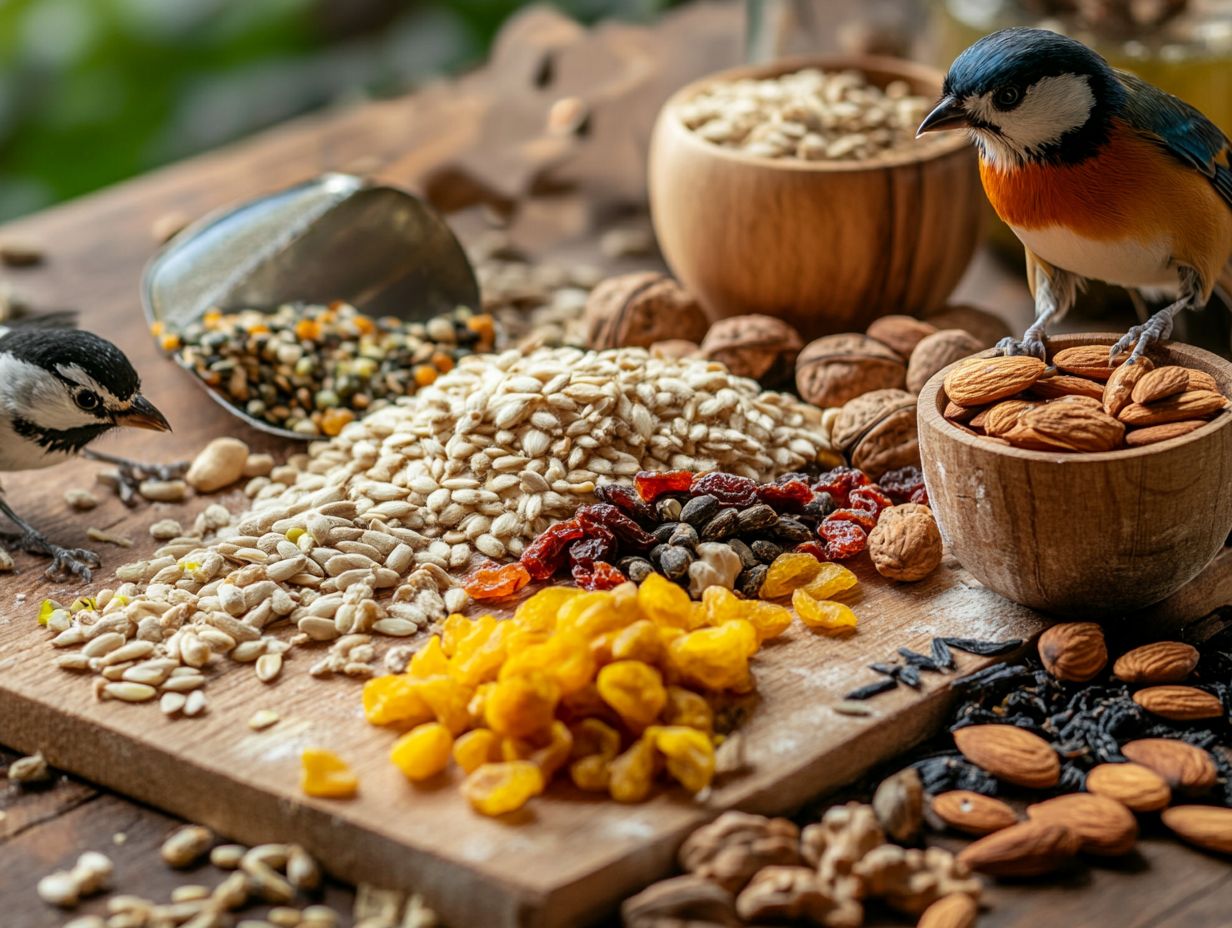
Recognizing the signs of quality bird food is crucial for attracting a vibrant array of birds and ensuring their health. Additionally, understanding how to choose the right toys is important; consider checking out 5 tips for selecting the right bird toys to keep them engaged and happy. Look for indicators like:
- Freshness
- A well-balanced mix of seeds
- The absence of mold or contaminants
These indicators are the hallmarks of premium bird food that any dedicated birdwatcher should prioritize. Additionally, using pet bird nutrition apps can help you invest in quality food that not only benefits the birds but enhances your bird-feeding experience.
When searching for superior products, consider options that avoid fillers such as corn and millet, which offer minimal nutritional value. Instead, opt for mixes that prominently feature black oil sunflower seeds, safflower, or peanuts ingredients that provide essential nutrients.
Checking labels for certifications can serve as a reliable quality indicator. Purchasing from reputable stores or well-established brands ensures the food has been properly processed and packaged, reducing the risks tied to spoilage.
Whether you’re browsing online or exploring local shops, being mindful of the ingredients you choose can significantly increase your chances of attracting a diverse and healthy array of bird species.
How Can One Find Affordable Bird Food?
Finding affordable bird food while maintaining quality can be quite a challenge for bird enthusiasts. However, with savvy shopping strategies think bulk purchasing and exploring local stores you can unlock significant savings.
By prioritizing budget-friendly options and seizing seasonal discounts, you’ll ensure your feathered friends receive the nourishment they need without straining your finances.
To maximize your savings, it s wise to shop around and compare prices at various outlets, including online platforms and local co-ops, which often offer appealing bulk rates or membership discounts.
You can also visit websites dedicated to bird care that guide you to reliable and cost-effective suppliers while providing user reviews to help you make informed choices. Engaging with community groups or forums focused on birdwatching can unveil shared insights and special deals within your local network.
Start crafting your budget-friendly strategy today to keep your birds happy and healthy!
What Are Some Popular Personal Preferences for Bird Food?
As a birdwatcher, you may develop distinct preferences for specific types of bird food. You might favor options like sunflower seeds, dried fruit, and peanut butter, depending on which bird species you wish to attract and their unique feeding behaviors.
Understanding these preferences can elevate your outdoor feeding experience, allowing you to craft a more personalized approach to drawing in backyard birds.
You re likely drawn to certain food types not just for their healthy options but also for their ability to attract a diverse array of feathered visitors. For instance, sunflower seeds often lure in larger songbirds, while varieties like nyjer seeds can beckon smaller finches. Dried fruits? They tend to capture the attention of migratory species seeking a quick energy boost during their journeys.
By strategically selecting and rotating different offerings based on seasonal shifts and regional bird populations, you can see a significant increase in bird diversity. This simple change can turn your backyard into a bustling bird paradise!
What Are Some Common Mistakes When Choosing Bird Food?
Many bird enthusiasts commonly stumble into pitfalls when selecting bird food. They might choose products that don’t cater to local bird species or overlook the importance of freshness and cleanliness. To enhance your bird recipes, consider these must-have ingredients that will benefit your feathered friends.
By being mindful of these missteps, you can enhance your bird feeding experience and better support the birds in your backyard.
Understanding the specific dietary needs of the birds that visit your area is crucial; what delights one species may not attract another. A little research into local avian favorites like sunflower seeds for finches or suet for woodpeckers can significantly enhance your chances of drawing a diverse array of birds.
Quality is key when it comes to bird food. Always choose reputable brands that guarantee freshness; stale or moldy feed not only discourages birds but can also jeopardize their health. Consider adding yummy treats birds can’t resist to their diet for added appeal.
By educating yourself on these essential aspects, you’ll ensure a delightful birdwatching experience while positively contributing to the well-being of your feathered visitors.
Frequently Asked Questions
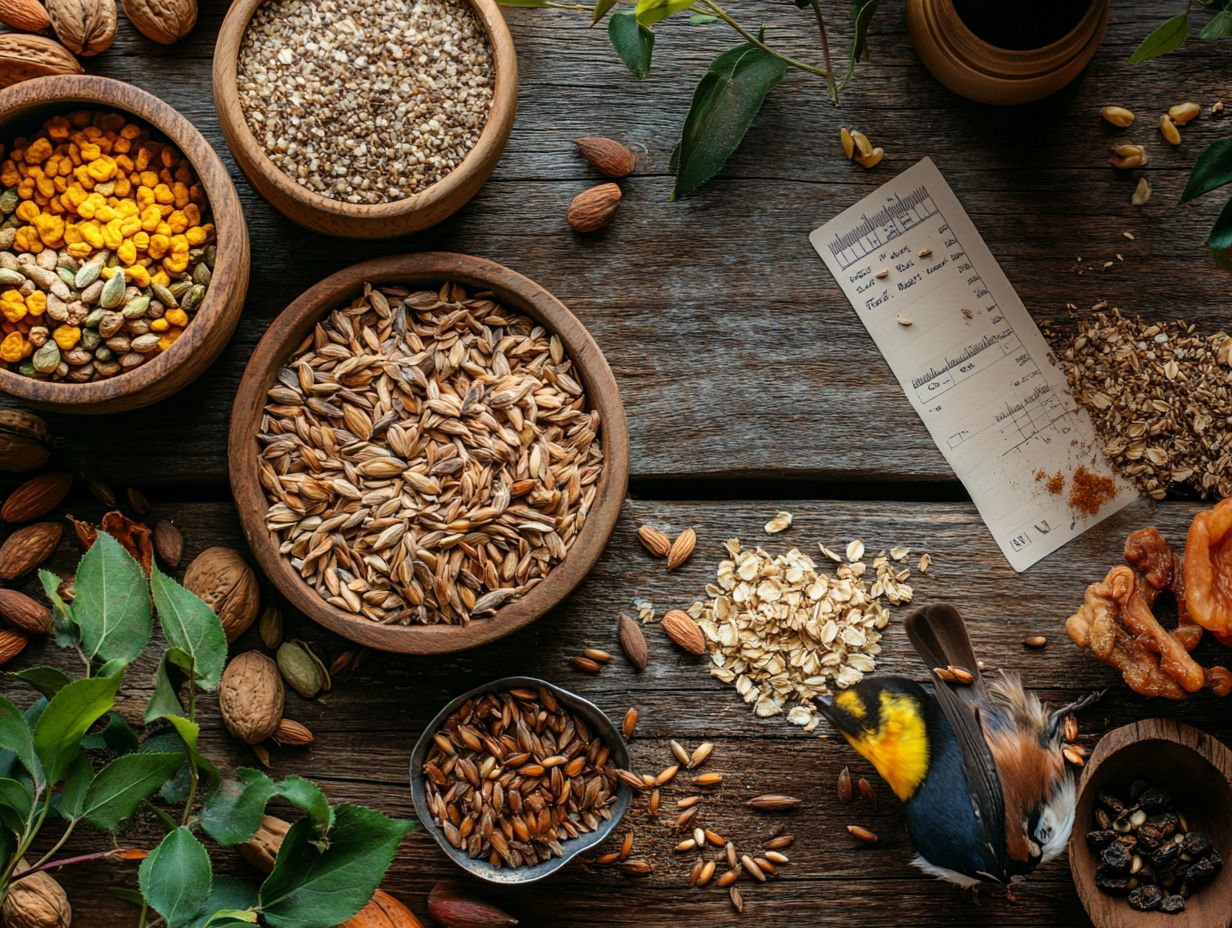
What are the 5 key factors to consider when choosing bird food?
- Nutritional value
- Type of bird
- Seed mix
- Freshness
- Brand
How do I determine the nutritional value of bird food?
Look for bird food that contains a variety of seeds, fruits, and insects for a balanced diet. For more detailed guidance, refer to this resource on how to choose the right bird food for your species. Check the ingredients label for the percentage of protein, fat, and fiber.
Is it important to consider the type of bird when choosing food?
Yes, different birds have different dietary needs, so it is essential to choose food specifically formulated for the birds you are feeding.
What should I look for in a seed mix for birds?
A good seed mix should include a variety of seeds, such as sunflower, millet, and safflower, along with some fruits and insects. Avoid mixes with a lot of filler ingredients like corn or milo.
Why is freshness important in bird food?
Fresh food keeps birds healthy and happy. Always check expiration dates or purchase from stores with high turnover to ensure freshness.
Does the brand of bird food matter?
Yes, it is important to choose a reputable brand that uses high-quality ingredients and has a good track record. Cheaper brands may not provide the same level of nutrition for your birds.
What have you discovered about attracting birds? Share your tips in the comments!

